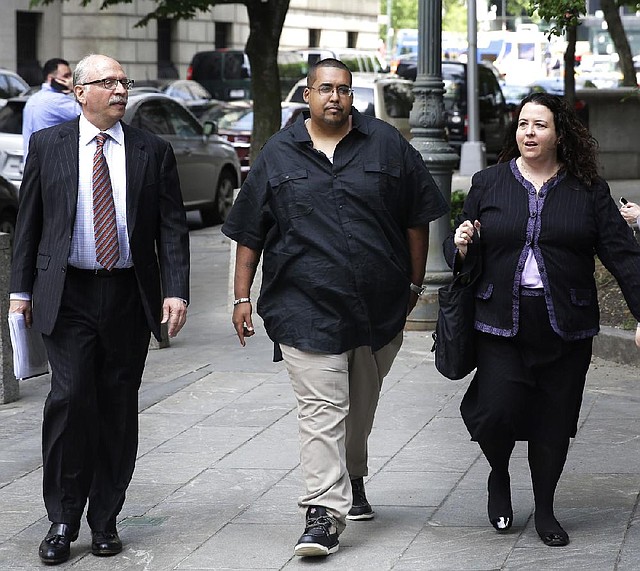Hacker who told all walks free
Judge cites ‘extraordinary’ help stopping cyberattacks
Hector Xavier Monsegur (center) arrives at his sentencing hearing Tuesday in New York with members of his legal team.
Wednesday, May 28, 2014
NEW YORK -- A former Anonymous hacker who faced 26 years in prison for staging global cyberattacks was set free by a judge who credited him with helping prevent at least 300 such intrusions, including one on the U.S. Senate website.
U.S. District Judge Loretta Preska in Manhattan federal court cited Hector Xavier Monsegur's "extraordinary assistance" in secretly working with the U.S. government, sentencing him Tuesday to the seven months he'd already spent in custody. She credited him for immediately agreeing to cooperate when confronted about his hacking by federal agents.
"That personal characteristic of turning on a dime and doing good instead of evil is the important factor in this sentence," Preska said. "You've done as much as any human being can do in terms of helping the government to make up for past wrongs and to avert other damage to probably millions of people."
Monsegur, 30, who used the online name Sabu, belonged to the hacker groups Internet Feds and LulzSec, an offshoot of Anonymous.
LulzSec attacked computer networks at Nintendo Co. and stole confidential data on more than 70,000 potential contestants on Fox Television's The X-Factor, prosecutors said. The group also attacked the computer networks of Sony Corp., the U.K.'s National Health Service, the Arizona State Police, and technology-security company HBGary Inc., the U.S. said.
After agreeing to cooperate with the government, Monsegur worked "around the clock," talking to hackers around the globe, including LulzSec, which had vowed to destroy evidence and disband if any members were arrested, the judge said. Monsegur also helped prevent a cyberattack on a foreign energy company and another on the water supply in a major U.S. city, Preska said.
Tuesday in court, Monsegur apologized for the harm he'd caused and said he had learned many lessons since he pleaded guilty to 12 crimes in August 2011.
"I assure you I will not be back in this courtroom," he said. "I'm not the same person you saw three years ago. I'm ready to move on."
Assistant U.S. Attorney James Pastore asked Preska not to impose a mandatory two-year prison term, citing Monsegur's help.
While federal sentencing guidelines, which are advisory, called for 21½ years to more than 26 years in prison, court officials recommended probation.
"It's difficult to quantify Mr. Monsegur's cooperation," said Pastore, adding that the defendant helped identify "back doors" or weaknesses in computer systems in corporations and foreign governments. "He was able to unmask and thwart outright or minimize hundreds of attacks," he said.
During the time of his secret cooperation, Monsegur worked from his apartment, staying up all night talking online to his fellow hackers and then meeting with authorities passing on what he learned.
Evidence Monsegur helped develop led to the prosecution of at least five hackers, including Jeremy Hammond, who was convicted and sentenced to 10 years in prison by Preska for an attack on the intelligence firm Strategic Forecasting Inc., or Stratfor, and for interfering with eight other computer systems.
Anonymous called Monsegur a traitor in a posting on Twitter after the sentencing.
"Jeremy Hammond is serving a ten-year sentence for hacks that Sabu (working for the feds) told him to do," the group said in a posting.
Philip Weinstein, Monsegur's lawyer, said after Tuesday's sentencing that the hacker is still helping the government with other cases. Monsegur has been unemployed while awaiting sentence, Weinstein said.
"He's taught the government things that they don't know," he said.
Hackers affiliated with Monsegur had attacked the websites of the governments of Algeria, Yemen and Zimbabwe, the U.S. previously said.
Monsegur's family had to be relocated by the FBI when his identity as a government informant was made public, his lawyer Peggy Cross-Goldenberg said Tuesday.
He also was threatened by some who incorrectly speculated that he assisted in the investigation and prosecution of Silk Road, the billion-dollar online website where customers used bitcoins to buy and sell drugs, according to the U.S.
The case is U.S. v. Monsegur, 11-cr-00666, U.S. District Court, Southern District of New York (Manhattan).
A Section on 05/28/2014
